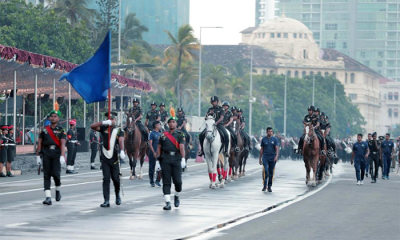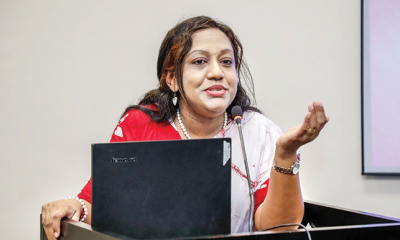News
Achieving national unity and reconciliation requires multi-partisan consultations and acceptance: NPC

The National Peace Council (NPC) has expressed concerns about certain aspects of the Office for National Unity and Reconciliation (ONUR) Bill. The NPC has in a media statement said that it is concerned about the role given to ONUR to be prescriptive vis a vis civil society by virtue of the power “to guide and facilitate peace and reconciliation programmes conducted by local organisations including community based organisations.”
Text of the NPC statement: The government is proposing to establish an office for national unity and reconciliation by an Act of Parliament in order to assure to every citizen is provided with equal opportunities in the economic, social, cultural and political spheres as given by the Constitution whilst safeguarding the identity and to build an inclusive and equitable society in which diversity will be respected and all communities will coexist in harmony and unity.
The draft law has been sent to the Sectoral Oversight Committee on Reconciliation and National Unity for its observations. The National Peace Council appreciates the initiative of the Sectoral Oversight Committee to inform civil society that they are open to proposals for revision to be incorporated into the draft law.
The ONUR Bill is a broad one encompassing ethnic, religious and social harmony issues. The office that is set up will be mandated to make necessary recommendations to the government and relevant authorities towards achieving national unity, reconciliation, and durable peace in the country and formulate a national policy and national action plan on reconciliation and coexistence. However, the proposed law has received little or no publicity in the media and its existence is unknown to most of the population. Therefore, we request the government to give more time for public discussion to take place.
The National Peace Council (NPC) expresses concern about certain aspects of the ONUR Bill. NPC is concerned about the role given to ONUR to be prescriptive vis a vis civil society by virtue of the power “to guide and facilitate peace and reconciliation programmes conducted by local organisations including community based organisations.”
This authority in terms of subjects to monitor and review the work of civil society raises apprehensions about its potential oppressiveness in the context of the national reconciliation policy and action plan. These are genuine fears as even the ICCPR Act that sought to incorporate hate speech provisions prohibited by the International Covenant on Civil and Political Rights into the national law, has been systematically used punitively against those who oppose the government politically.
Another area of concern is the process for appointing the decision-making body of ONUR. As per the current draft, the Minister overseeing ONUR will select and the President will appoint the 11 committee members. Already there are many voices to state that the minorities have been ignored in committees of such nature. This process raises the possibility of unilateral decision-making and political bias, contrary to the intentions of the 21st Amendment, which aimed to prevent such occurrences. The NPC emphasises the importance of appointing non-partisan members in line with the spirit of the 21st Amendment.
The laudable objectives outlined in the ONUR Bill, such as promoting national unity and peaceful coexistence, require dialogue and negotiation among representatives of diverse communities in Sri Lanka. The NPC urges the government to engage with opposition political parties, particularly those representing minority ethnic and religious communities, as well as civil society, to establish a multi-partisan consensus, encompassing pluralistic values on the path to make this a true reconciliation process for national unity.
The National Peace Council is an independent and non-partisan organisation that works towards a negotiated political solution to the ethnic conflict in Sri Lanka. It has a vision of a peaceful and prosperous Sri Lanka in which the freedom, human rights and democratic rights of all the communities are respected. The policy of the National Peace Council is determined by its Governing Council of who are drawn from diverse walks of life and belong to all the main ethnic and religious communities in the country.
News
US sports envoys to Lanka to champion youth development

The U.S. Embassy in Colombo welcomed the U.S. Sports Envoys to Sri Lanka, former National Basketball Association (NBA) and Women’s National Basketball Association (WNBA) players Stephen Howard and Astou Ndiaye, from June 8 through 14.
The Public Diplomacy section of the U.S. Embassy said that it would launch a weeklong basketball program intended to harness the unifying power of sports, made possible through collaboration with Foundation of Goodness and IImpact Hoop Lab.
While in Sri Lanka, Howard and Ndiaye, both retired professional basketball players, will conduct a weeklong program, Hoops for Hope: Bridging Borders through Basketball. The Sports Envoys will lead basketball clinics and exhibition matches and engage in leadership sessions in Colombo and Southern Province for youth aged 14-18 from Northern, Uva, Eastern and Western Provinces, offering skills and leadership training both on and off the court. The U.S. Envoys will also share their expertise with the Sri Lanka Basketball Federation, national coaches, and players, furthering the development of basketball in the country. Beyond the clinics, they will collaborate with Sri Lankan schoolchildren to take part in a community service project in the Colombo area.
“We are so proud to welcome Stephen and Astou as our Sports Envoys to Sri Lanka, to build on the strong people-to-people connections between the United States and Sri Lanka,” said U.S. Ambassador Julie Chung. “The lessons that will be shared by our Sports Envoys – communication, teamwork, resilience, inclusion, and conflict resolution – are essential for leadership development, community building, equality, and peace. The U.S. Sports Envoy program is a testament to our belief that sports can be a powerful tool in promoting peace and unity.”
News
Rahuman questions sudden cancellation of leave of CEB employees

SJB Colombo District MP Mujibur Rahuman in parliament demanded to know from the government the reasons for CEB suspending the leave of all its employees until further notice from Thursday.
MP Rahuman said that the CEB has got an acting General Manager anew and the latter yesterday morning issued a circular suspending leave of all CEB employees with immediate effect until further notice.
“We demand that Minister Kanchana Wijesekera should explain this to the House. This circular was issued while this debate on the new Electricity Amendment Bill was pending. There are many who oppose this Bill. The Minister must tell parliament the reason for the urge to cancel the leave of CEB employees,” the MP said.However, Speaker Mahinda Yapa Abeywardena prevented Minister Wijesekera responding to the query and said that the matter raised by MP Rahuman was not relevant.
News
CIPM successfully concludes 8th Annual Symposium

The Chartered Institute of Personnel Management (CIPM) successfully concluded the 8th Annual CIPM Symposium, which took place on 31st May 2024. Themed “Nurturing the Human Element—Redefining HRM in a Rapidly Changing World,” the symposium underscored the pivotal role of human resource management (HRM) in today’s dynamic global landscape. Since its inception in 1959, CIPM has been dedicated to advancing the HR profession through education, professional development, and advocacy, solidifying its position as Sri Lanka’s leading professional body for HRM.
Ken Vijayakumar, the President of the CIPM, graced the occasion as the chief guest. The symposium commenced with the welcome address by the Chairperson, Prof. Arosha Adikaram, followed by the Web Launch of the Symposium Proceedings and Abstract Book by the CIPM President. The event featured distinguished addresses, including a speech by Chief Guest Ken Vijayakumar, President of CIPM, and an address by Guest of Honor Shakthi Ranatunga, Chief Operating Officer of MAS Holdings Pvt. Ltd., Sri Lanka.
The symposium also featured an inspiring keynote address by Prof. Mario Fernando, Professor of Management and Director of the Centre for Cross Cultural Management (CCCM) at the University of Wollongong, Australia.
Vote of Thanks of the inauguration session was delivered by Dr. Dillanjani Weeratunga, Symposium Co-chair.
The symposium served as a comprehensive platform for researchers to present their findings across a wide range of critical topics in HRM. These included Cultural Diversity and Inclusion, Talent Development and Retention, Ethical Leadership and Corporate Social Responsibility, Adapting to Technological Advancements, Mental Health and Well-being at Work, Global Workforce Challenges, Employee Empowerment, and Reskilling and Upskilling.
The plenary session was led by Prof. Wasantha Rajapakse. Certificates were awarded to the best paper presenters during the valedictory session, followed by a vote of thanks delivered by Kamani Perera, Manager of Research and Development.
The annual symposium of CIPM was a truly inclusive event, attracting a diverse audience that spanned undergraduates, graduates, working professionals, research scholars and lecturers. This widespread interest highlights the symposium’s significance in the field of HRM, offering a unique opportunity for everyone to network and learn from scholarly brains.The CIPM International Research Symposium was sponsored by Hambantota International Port, Sri Lanka Institute of Information Technology (SLIIT), E B Creasy & Co. PLC, and Print Xcel Company.


















